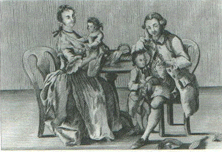|
|
|
|
Marriage Act of 1753 As we can see from these case studies, by
mid-century our country was much in need of the guidance of a collective
definition of marriage set forth by the government. The Marriage Act
of 1753, presented by Attorney General Ryder to
the House of Commons proposed the following: Marriage must take place with
banns and an officially purchased marriage license (the banns being read
publicly in church three consecutive Sundays prior to the wedding), the two
parties must receive parental permission if under age (under 21), the wedding
must be recorded in the Marriage Register with the signatures of both parties, What the Act Means for Us We have seen how the Marriage Act sought to prevent clandestine marriages by making them illegal. Therefore, we hope that now members of the elevated classes are less likely to marry people of the lower classes.19 This is especially true for those underage members of the gentry, who must receive parental permission to marry. It is unlikely that any sane parent would permit such an unfruitful match. The higher up on the social scale you are, the more power your parents can exert over you.20 Ladies, this consequence carries both good and bad news for our sex. It both widens and narrows the marriage market for us. It widens the market because if less men of our rank are marrying lower class women, that means that there are more upper class men available for us to marry. On the other hand, it means that our choices for husbands are restricted to a very narrow category of men. Just as it has become increasingly difficult for upper class men to "marry down," it has also become near impossible for us to marry men outside of our rank. Ladies, we all of course know the importance of holding onto our virginity until we enter wedlock. We can look to Pamela (that paragon of virtue) of Richardson's popular novel of the same name to remind ourselves of the importance of remaining virtuous, and to find a role model for our own behavior. Since the adoption of the Marriage Act, we need to be even more careful about protecting that precious jewel we call virginity. We can no longer rely on simple verbal promises of marriage as binding, and therefore must preserve our virtue until we have followed the due process of marriage as set forth in the Act. Our virginity is more prized now than ever.21 If we "yield to [our] lovers on a promise, [we] are ruined." 22 We also must remember that we are financially independent on men. We must preserve our precious jewel so that men will want to marry us, so that we are not left destitute.23 If you would like to learn more about this important topic, you may consider referring to conduct manuals such as "A Father's Legacy to His Daughters" by Reverend John Gregory, "A View of the Principles and Conduct Prevalent Among Women of Rank and Fortune," and "A Letter of Genteel and Moral Advice" by Wetenhall. You may also wish to consult our article on conduct manuals entitled "How to Snag a Baronet." Despite the fact that this act does pose some problems for
us as gentlewomen in English society, we must consider that it may improve the
productivity and moral character of our great nation of Britain. This act
will help us to manage our population, and therefore to increase our wealth
as well.24 We hope that the Marriage Act will promote the kind of
respectable marriages among the poor in which children will be produced that can
be industrious, honest workers for our nation. As the founders of the act
have stated: "propagation of the species and the good of society are the two
great ends we should have in view when we make any laws relating to
marriage...and without a continual supply of industrious and laborious poor, n As our century comes to a close, we can recognize a trend in our society spanning across art, literature, commerce, politics, and the family: a focus on the individual. But this growing emphasis on the well-being of the individual is at odds with many of the values which helped create the Marriage Act.27 As we know, the Act encourages the type of marriages which improve the moral character of our nation. Keeping this in mind, we should also realize that despite the recent emphasis on the individual, we should not only think of our own happiness when entering into a marriage, but also the good of the larger society, as encouraged by Dr. Gally: "... yet still it is contrary to the fundamental Laws of Society, that the gratifying of the private Whims and Fancies of a few should be preferr'd to the real and general Good of Society."28 We should also remember that "Society gives its Consent to Marriages only when those Circumstances and Conditions are observ'd, which it has thought proper to appoint." 29 Of course it is important to be happy in marriage, we should consider how our choices affect the happiness of others.
|
 witnesses, and the minister, and it must occur before witnesses and an
authorized clergyman. Under this act, verbal promises were no longer
considered binding.
witnesses, and the minister, and it must occur before witnesses and an
authorized clergyman. Under this act, verbal promises were no longer
considered binding. o
nation can long exist, which supply can be got only by promoting marriage among
such people." But as James Stueart explained, the Marriage Act sought to promote
a certain type of marriage: "children produced from parents who are able to
maintain them and bring them up to a way of getting bread for themselves, do
really multiply and serve the state. ... when marriage is contracted without
these requisites for multiplication, it produces [mere] procreation."
o
nation can long exist, which supply can be got only by promoting marriage among
such people." But as James Stueart explained, the Marriage Act sought to promote
a certain type of marriage: "children produced from parents who are able to
maintain them and bring them up to a way of getting bread for themselves, do
really multiply and serve the state. ... when marriage is contracted without
these requisites for multiplication, it produces [mere] procreation."